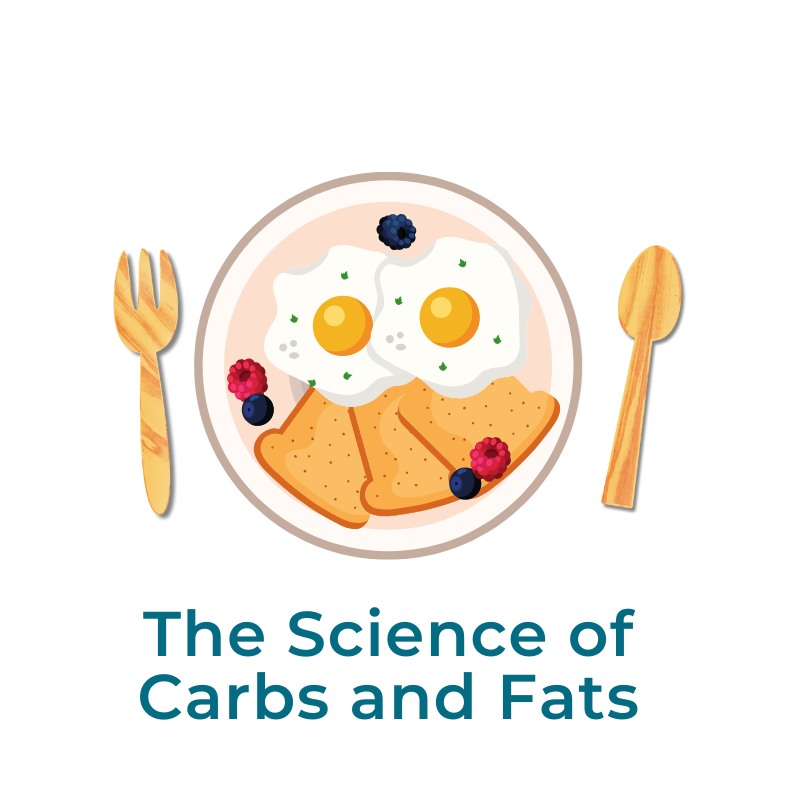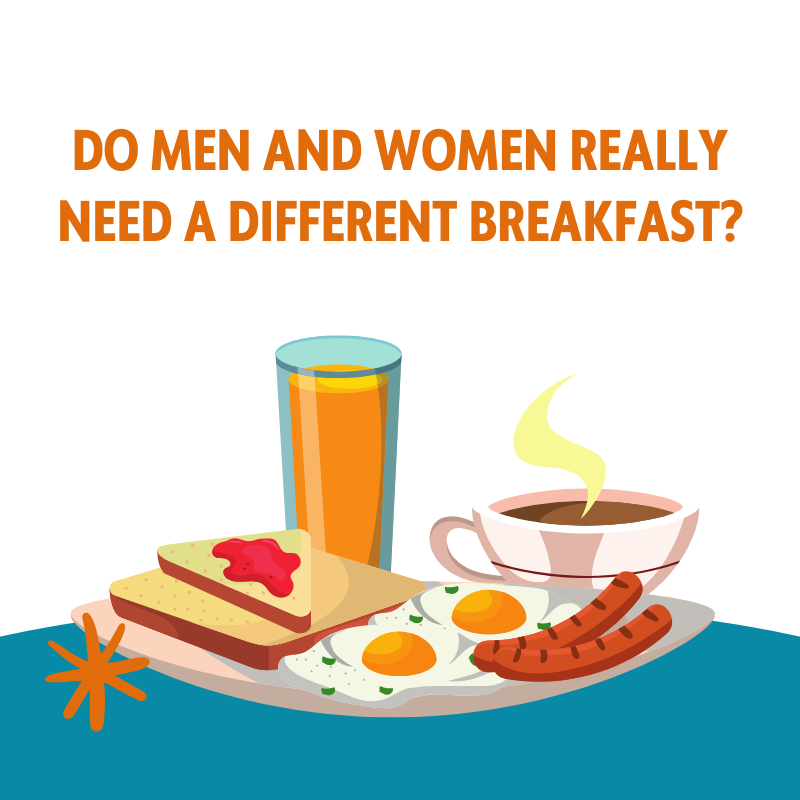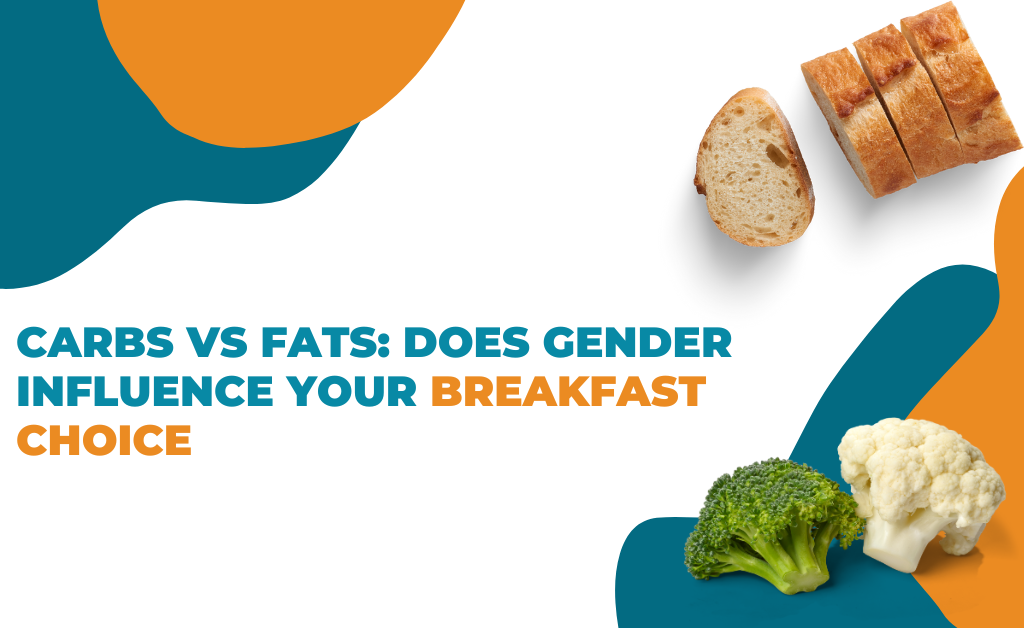Introduction: Carbs vs Fats The Breakfast Choice
The centuries-old argument between fats and carbohydrates frequently takes center stage when it comes to breakfast. Depending on our preference, many of us opt for a plate of eggs and avocado or a hearty bowl of oatmeal as we try to nourish our bodies after a restful night’s sleep.
But which of these macronutrients is better for your morning meal depending on your gender? Though personal preferences, lifestyle, and health objectives should always come first, it’s worthwhile to consider how gender may affect the kind of carbohydrates and fats you choose for breakfast.
The Science of Carbs and Fats

Let’s first address the functions of carbs and fats in your breakfast before delving into the impact of gender:
The body prefers to use carbohydrates as an energy source, particularly for the muscles and brain. Simple carbohydrates, like those in sugary cereals, give you a rapid energy boost, while complex carbohydrates, like those in whole grains, fruits, and vegetables, provide you energy that lasts all day.
Conversely, fats offer a longer-lasting energy source and breakdown more slowly. For hormone balance, brain health, and general cellular function, healthy fats—like those in avocados, almonds, seeds, and olive oil—are essential.
For the best energy and health benefits, picking your breakfast frequently involves striking a balance between these two macronutrients.
Carbs For Men: Fuel For Performance and Recovery
Testosterone, which is involved in energy expenditure and fat metabolism, is typically higher in men. Because of their hormonal makeup, males often burn fat more effectively than women. They could therefore be able to withstand higher-fat meals without feeling as lethargic right away as some women would.
A higher metabolic rate and a stronger ability to use fats for energy can result from men’s bodies having more lean muscle mass. Men may have long-lasting energy from a breakfast rich in healthy fats, such as avocado and eggs, without experiencing the blood sugar spikes that high-carb meals can cause.
Fats For Women: Hormonal Balance and Steady Energy
There is no doubt that, due to biological variations, men and women have distinct dietary needs. These variations may affect our breakfast preferences by affecting the way we digest and use macronutrients like fats and carbohydrates.
According to research, women may be more susceptible than men to changes in insulin, particularly at different phases of the menstrual cycle. The hormone insulin is essential to the body’s metabolism and aids in controlling blood sugar levels. Women may be more sensitive to carbohydrates during the follicular phase (the first half of the monthly cycle) and less sensitive during the luteal phase (the second half), indicating that their insulin sensitivity can fluctuate throughout the month.
Therefore, women’s energy levels may vary depending on how much carbohydrates they consume, especially during different stages of their cycle. A more balanced diet with fats and proteins may be more advantageous during the luteal phase, when insulin sensitivity is lower, whereas a carbohydrate-heavy breakfast, such as whole grain toast with fruit, may provide more instant energy in the follicular phase.
Do Men and Women Really Need a Different Breakfast?

Although the fundamentals of nutrition are universal, such as the requirement for a balanced macronutrient intake, men and women might absorb or use these nutrients differently, which may affect how they should choose their breakfast. Let’s examine each of the things to take into account.
- Hormonal Variation: The way that women feel after eating can be influenced by the hormonal changes that occur during their menstrual cycle. Women typically have more steady insulin sensitivity in the first part of the cycle, which may help them absorb carbohydrates more effectively. But as insulin sensitivity declines in the second part of the cycle, women may benefit from eating a higher-protein and higher-fat breakfast to keep their blood sugar levels stable.
With steady testosterone levels that contribute to muscle maintenance and fat metabolism, men’s hormonal profiles are more constant. Men’s bodies may be able to withstand higher-fat breakfasts than women because testosterone aids in the more effective processing and utilization of fat. A meal that contains more healthy fats, such as avocado, eggs, or nuts, may help men feel fuller for longer periods of time without experiencing sharp increases in blood sugar.
- Metabolism: Men and women have different metabolisms. Since men have more muscular mass than women, they often have higher basal metabolic rates (BMRs). Men often have an easier time burning calories and may need more energy at breakfast since muscle burns more calories than fat.
In contrast, women may burn calories more slowly and have a higher amount of body fat, particularly as they age. Therefore, women may benefit from a breakfast that prioritizes protein and healthy fats over carbohydrates in order to keep them satiated for longer.
- Physical Activity: The extent of physical activity has a significant impact on whether men and women should have different breakfast habits. Due to the calories burned during exercise, highly active people have higher energy needs. Restoring energy stores and promoting muscle recovery are best achieved with a meal that is well-balanced in terms of protein, carbohydrates, and fats.
- Aging: The dietary requirements of men and women change with age. For instance, menopause may cause hormonal changes in older women that impact appetite and metabolism. Women may have a slower metabolism and store more fat if their estrogen production declines. A lower-carb, higher-protein breakfast may help older women fight this by maintaining a healthy weight and preserving muscle mass. Age-associated decreases in testosterone levels in men can also have an impact on metabolism and muscle mass. A higher-protein breakfast may assist older men in maintaining their energy levels and support the health of their muscles. They may also require more protein to retain lean muscle mass.
Balanced Breakfast Ideas For Both Genders
The combination of macronutrients—fats, proteins, and carbohydrates—found in a healthy meal helps to feed your body and maintain consistent energy levels throughout the morning. These breakfast suggestions can improve focus, sustain energy levels, and support general health for both men and women. The following wholesome, filling breakfast choices are suitable for all:
- Toast with avocado and egg: This meal provides an excellent combination of fiber, protein, and healthy fats. The eggs are a great source of protein, while the avocado offers monounsaturated fats. Fiber and complex carbs found in whole grain bread help you feel fuller for longer.
- Parfait with Greek Yogurt: The mixed berries offer fiber and antioxidants, while Greek yogurt is rich in calcium and protein. Chia seeds add extra fiber and omega-3 fatty acids, while nuts supply good fats. A little natural sweetness can be added with a honey spread.
- Fruit and Nut Butter Oatmeal: Nut butter contributes protein and healthy fats, while oatmeal is a fantastic source of fiber and complex carbohydrates. Chia or flax seeds increase fiber and omega-3s, while bananas provide potassium for energy.
- Cheese and Veggie Scramble: Vegetables contribute vitamins, minerals, and fiber, while eggs are a great source of protein. The cheese provides protein and good fats, making this a filling breakfast choice.
- Bowl of Smoothies: Fruit antioxidants, Greek yogurt protein, and chia seed good fats are all combined in this smoothie bowl. Granola gives it a crunchy texture, and kale or spinach adds extra nutrients without changing the taste.
- Berries and Nuts in Chia Seed Pudding: Protein, fiber, and omega-3 fatty acids abound in chia seeds, and almond milk offers a low-calorie, dairy-free foundation. Nuts and mixed berries provide healthful lipids and antioxidants.
- Fruit and Nut Butter on Whole Grain Pancakes: Almond butter provides protein and healthy fats, while whole grains offer fiber. This meal is a healthy and filling choice because fruit naturally provides flavor and nutrition.
- Breakfast Bowl with Quinoa: Quinoa is the ideal base for a substantial meal since it is a complete protein, meaning it contains all nine essential amino acids. Berries offer antioxidants, and chia seeds with almond butter contribute good fats.
Conclusion: Listen To Your Body
There is no one-size-fits-all strategy when it comes to nutrition. Although there are broad rules regarding what makes a “healthy” breakfast, the most crucial thing is to learn to pay attention to your body. Regardless of your gender, age, or level of exercise, you can make better breakfast choices by listening to the signals your body gives because it is particularly suited to your needs.
In light of its complexity, our bodies frequently provide us with hints about what they require. Paying attention to these cues, whether they include cravings for particular foods or feeling lethargic after consuming them, can be a useful strategy for improving your diet and overall health.
Some of the clearest indicators to help you make breakfast choices are your body’s hunger and fullness sensations. Does the fact that it’s “time” for breakfast make you feel like eating, or are you actually hungry in the morning? When they wake up, some people might feel extremely hungry, while others might not feel hungry at all. It’s crucial to pay attention to whether you need a large meal or simply a light snack rather than pushing yourself to eat.
Another way your body expresses its demands is through cravings. Your muscles may need to be supported or repaired if you have a protein hunger. Your body may be requesting a rapid energy boost if you’re seeking something sweet. Although it’s crucial to resist all cravings, being aware of the reasons behind your food cravings will assist you in making thoughtful decisions.
How you feel after eating is greatly influenced by your digestive system. Bloating, gas, or heartburn are examples of digestive pain that may be a sign that the meal you’ve chosen isn’t working for your body. This can indicate that you’re eating too much of one macronutrient or that you have a dietary intolerance.
The following are some practical tips that may help you pay attention to your body’s cues and opt a meal that will actually nourish you:
- Complete mixed breakfast: See how you feel by experimenting with different ratios of proteins, lipids, and carbohydrates. Selecting a breakfast that gives you a sense of lightness and energy may help you remain satisfied for longer.
- Monitor Your Energy Levels: After every breakfast, monitor your mood throughout the morning. Do you have an energy collapse in the middle of the morning? Do you have enough energy for lunch?
- Pay Attention to Portion Sizes: If you’re not hungry, don’t force yourself to eat a lot. Your body may just require a smaller, more balanced breakfast, particularly if you have a slower metabolism or feel lethargic after large meals.
- Try Different Timing: While some people feel hungry within a few hours of getting up, others like to eat immediately after. Try to have a little snack or a drink first thing in the morning if you’re not a morning eater, and reserve a larger meal for when you’re ready to eat.
- Examine the Effects of Various Foods on You: Observe your feelings after eating particular foods. Is a protein-based breakfast more satisfying to you, or do you feel better after eating healthy grains? You may improve your morning meal by knowing what meals are ideal for you.
Takeaway:
The optimal breakfast option ultimately depends on the individual, even though there are some biological and hormonal differences between men and women, according to the debate over gender-based breakfast needs. The most crucial element in selecting the ideal morning meal is still paying attention to your body, even though gender might affect things like metabolism, appetite, and hormonal changes.
The secret to a nutritious breakfast, regardless of gender, is balance: a mix of complex carbs, healthy fats, and protein that suits your particular energy requirements, degree of activity, and way of life. The future of nutrition lies in personalization; by learning how different foods affect your mood and making the necessary adjustments, you can discover the ideal breakfast that suits you best.
FAQ:
Do men and women metabolize carbs and fats differently?
Indeed, there are differences in how men and women metabolize fats and carbohydrates. Men can burn fat more effectively because they typically have higher metabolic rates and more muscle mass. Contrarily, women typically store more fat and undergo hormonal changes (such as those that occur during the menstrual cycle) that may impact their ability to metabolize fats and carbs.
Should women avoid carbs altogether?
No, women shouldn’t completely refrain from carbohydrates. A balanced diet must include carbohydrates since they give the body and brain energy. The secret is to choose complex, healthful carbohydrates that are high in fiber and minerals, such as fruits, vegetables, and whole grains. Energy imbalances and nutrient shortages might result from avoiding all carbohydrates.
Can men benefit from high-fat breakfast?
It is true that men can gain from eating a high-fat breakfast, particularly if it contains good fats from foods like nuts, avocados, and olive oil. In addition to supporting the development of hormones like testosterone, healthy fats can aid in satiety and provide long-lasting energy.
How does it affect carb and fat needs for men and women?
Men’s and women’s needs for fat and carbohydrates depend on a variety of factors, including hormone levels, exercise levels, and metabolism. Since men tend to have larger muscles and a quicker metabolism, they may burn fat more effectively and eat more fat. Women may have different carb sensitivities and occasionally need more carbohydrates for energy due to hormonal swings, particularly during the menstrual cycle.
What are some gender-neutral breakfast ideas?
Gender-neutral breakfast includes oatmeal with fruit and nuts, Greek yogurt parfait, Egg and vegetable scramble, smoothie, Eggs, and avocado toast are rich sources of complete breakfast.


